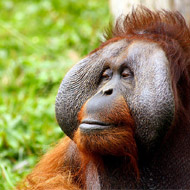'Kiss squeak’ study reveals insights into human language

The orangutan is unique to the primate world in that its predominant call is voiceless.
New research by Durham University has revealed insights into the origins of human language.
Writing in the journal Nature Human Behaviour, scientists reveal how and why one of our closest ape relatives combined a consonant with a vowel to make the first word.
In the study, researchers analysed more than 4,400 individual recordings of consonant-like calls or ‘kiss squeaks’ from 48 orangutans.
They found that the sound frequency and the duration of an orangutan's ‘kiss squeak’ varies depending on its body size, individual identity, or situational circumstance. Dr Adriano Lameira of the Department of Anthropology explains:
“We found that orangutan body-size significantly affected the maximum frequency of the kiss squeak, whilst the context in which the squeak was made affected duration of the call. Our study also indicates that population membership and individual identity affects the frequency and duration of the kiss squeak.
“These findings suggest that consonant-like calls are potentially as adaptive as vowel-like calls, so the communicative functions of both call types may have been equal.”
The orangutan is unique to the primate world in that its predominant call is voiceless. The study aimed to discover if these consonant-like calls could send information that is similar to voiced calls, which more closely resemble vowel-like sounds.
The team argues that it is more likely that those early sounds, known as ‘proto-consonants’ and ‘proto-vowels’, were first combined to send the same information via difference acoustic channels. In turn, this may have given rise to the earliest syllable or word.
Dr Lameira continues: “Our research indicates that both types of sounds convey similar information, so combining them would have strengthened the message a sound conveyed, rather than adding new information.
“Understanding the meaning behind early consonant and vowel sounds helps us to get closer to understanding the point in language evolution when consonants and vowels became inseparable. Ultimately we hope to be able to reconstruct speech evolution, to understand the basic building blocks, how they came together and in what order."



 The BSAVA has opened submissions for the BSAVA Clinical Research Abstracts 2026.
The BSAVA has opened submissions for the BSAVA Clinical Research Abstracts 2026.